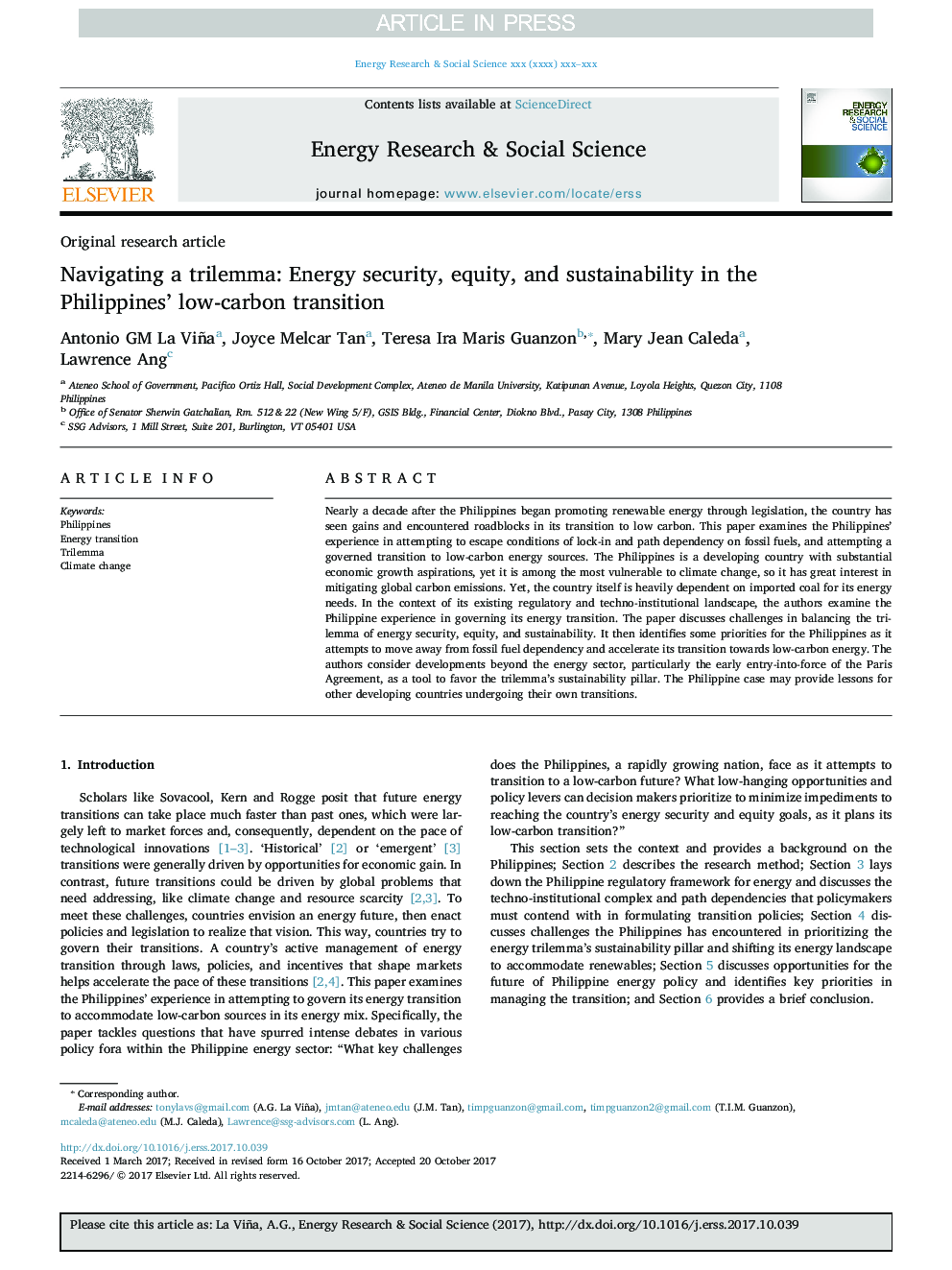| کد مقاله | کد نشریه | سال انتشار | مقاله انگلیسی | نسخه تمام متن |
|---|---|---|---|---|
| 6557747 | 1422566 | 2018 | 11 صفحه PDF | دانلود رایگان |
عنوان انگلیسی مقاله ISI
Navigating a trilemma: Energy security, equity, and sustainability in the Philippines' low-carbon transition
ترجمه فارسی عنوان
حرکت سه گانه: امنیت انرژی، حقوق صلح آمیز و پایداری در انتقال سریع کربن فیلیپین
دانلود مقاله + سفارش ترجمه
دانلود مقاله ISI انگلیسی
رایگان برای ایرانیان
کلمات کلیدی
فیلیپین، انتقال انرژی، سهلم تغییر آب و هوا،
ترجمه چکیده
تقریبا یک دهه پس از آنکه فیلیپین از طریق قوانین به حمایت از انرژی تجدیدپذیر تبدیل شد، کشور شاهد موفقیت بوده و در مواجهه با کمبود کربن مواجه شده است. این مقاله تجربه فیلیپین را در تلاش برای فرار از شرایط وابستگی قفل و مسیر به سوخت های فسیلی و تلاش برای انتقال به مصرف منابع انرژی کم کربن بررسی می کند. فیلیپین یک کشور در حال توسعه با آرزوهای رشد اقتصادی محسوب می شود، در عین حال یکی از آسیب پذیر ترین تغییرات اقلیمی است، بنابراین علاقه زیادی به کاهش انتشار کربن جهانی دارد. با این حال، کشور خود به شدت وابسته به زغال سنگ وارداتی برای نیازهای انرژی آن است. نویسندگان در زمینه چارچوب قانونی و تکنولوژیکی موجود خود، تجربیات فیلیپینی را در اداره انتقال انرژی خود بررسی می کنند. این مقاله چالش هایی را در جهت توازن سه گانه ای از امنیت انرژی، عدالت، و پایداری مطرح می کند. پس از آن برخی از اولویت های فیلیپین را به عنوان حرکت به دور از وابستگی به سوخت فسیلی و سرعت بخشیدن به انتقال آن به انرژی کم انرژی کربن تعیین می کند. نویسندگان تحولات فراتر از بخش انرژی، به ویژه در هنگام ورود به زور از توافقنامه پاریس، به عنوان یک ابزار برای حمایت از ستون پایداری سهگانه، را در نظر می گیرند. پرونده فیلیپین ممکن است برای سایر کشورهای در حال توسعه در حال گذراندن گذراندن دوره خود درس بخواند.
موضوعات مرتبط
مهندسی و علوم پایه
مهندسی انرژی
انرژی (عمومی)
چکیده انگلیسی
Nearly a decade after the Philippines began promoting renewable energy through legislation, the country has seen gains and encountered roadblocks in its transition to low carbon. This paper examines the Philippines' experience in attempting to escape conditions of lock-in and path dependency on fossil fuels, and attempting a governed transition to low-carbon energy sources. The Philippines is a developing country with substantial economic growth aspirations, yet it is among the most vulnerable to climate change, so it has great interest in mitigating global carbon emissions. Yet, the country itself is heavily dependent on imported coal for its energy needs. In the context of its existing regulatory and techno-institutional landscape, the authors examine the Philippine experience in governing its energy transition. The paper discusses challenges in balancing the trilemma of energy security, equity, and sustainability. It then identifies some priorities for the Philippines as it attempts to move away from fossil fuel dependency and accelerate its transition towards low-carbon energy. The authors consider developments beyond the energy sector, particularly the early entry-into-force of the Paris Agreement, as a tool to favor the trilemma's sustainability pillar. The Philippine case may provide lessons for other developing countries undergoing their own transitions.
ناشر
Database: Elsevier - ScienceDirect (ساینس دایرکت)
Journal: Energy Research & Social Science - Volume 35, January 2018, Pages 37-47
Journal: Energy Research & Social Science - Volume 35, January 2018, Pages 37-47
نویسندگان
Antonio GM La Viña, Joyce Melcar Tan, Teresa Ira Maris Guanzon, Mary Jean Caleda, Lawrence Ang,
